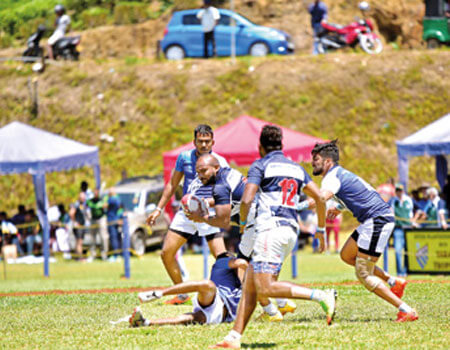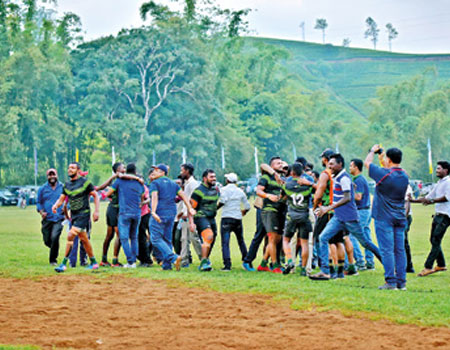
Please Share your Email if you Wish to Receive the Golden Tips & Tales Newsletter from History of Ceylon Tea Website



Overlooking the lush green of the golden valley of tea — Dickoya Maskeliya Cricket Club hosted the Inter-Plantations Rugby Sevens for the 19th year. A carnival atmosphere prevailed with lots of entertainment for the planting fraternity and to their friends who had travelled from Colombo. The heat was bearable and a change from being in a rugby ground in Colombo.
Rugby came alive in the region that was one of the core sponsors that formed the Ceylon Rugby Football Union in 1908. The Plantation Sevens brings to life history, as in 1908 the club was one of six founding rugby clubs which formed the Ceylon Rugby Football Union. Now known as Sri Lanka Rugby they should look the way of this tournament and support as it appeared many from estate background were playing the game.
I do think there is potential for the promotion of the game and also host a tournament together with a push for a holiday with rugby. There is rugby in these parts and the history of the game tells a story. There are rugby players who can develop the game in and around the plantations. It should be a lead to get into rugby. May be this could lead to another ‘B’ Division team in the hills.
There was no roasting as in Colombo. Though a little warmer for Dickoya, than usual, the atmosphere was better for rugby as the Sevens was kicked off on Saturday, March 30. Thirteen plantation companies were in the thick of rugby at the Dickoya Maskeliya Cricket Club formed by British tea planters and founded in 1868. The club house and grounds are situated at the foothills of Darrawella Estate and is often called the Darrawella Club. The organising committee of DMCC comprising , the President – Arjun Perera, Secretary – R.M. Samarakoon, Treasurer – K.G. Samaratunga, provided the logistics and support to make this even a success.
There were 13 companies fielding 16 teams for the Bowl, Plate and Cup titles. Tallawakelle Plantations won the Cup beating Elkaduwa Plantation who was playing for the first time. Malwatte Valley won the Plate while newcomers Hapugastenne won the Bowl. I was told that both Elkaduwa and Hapugasthenna have many rugby recruits and will continue to be a force to be reckoned with in the future.
Finlay’s Tea Estates Chief Executive Officer, Dushan Ratwatte while being the Chief Guest at the occasion also spurred Hapugastenna. His leadership was inspiring as he kept his team morale while urging players and supporters to respect the officials and the requirements of perimeter control. Rugby is not only about winning but it is also a way of life. Reminds me of the 400 BC King Attila the Hun “Leaders must have an inherent commitment to influence people, processes, and outcomes”. Well done.
A team who won Cup semi-final was disqualified for fielding an unregistered player. It is unfortunate that the win at all costs mentality has pervaded into the corporate sector in a tournament that displayed a lot of camaraderie. The games saw a rare yellow and that too for repeated infringements while there were almost none for dangerous play and no cross talk with the match officials. The absolute resolve of being firm by the tournament organisers was seen of being unwilling to compromise when the issue of non registered player being on the field was discovered has to be appreciated.
The club played the first Rugby match in March 1880 against fellow Up Country club, Dimbula Athletic and Cricket Club. The annual rugby match between Dimbulla and Dickoya, was one of the oldest rugby competitions in Sri Lanka. It seems to have faced a natural death.
The club has played in the Clifford Cup final. A combined Dimbula and Dickoya rugby team, commonly known as the Dim/Dicks, captained by Malcolm Wright played in 1956 and 57 losing to CR in the final.
In 1958 Dickoya, led by Barry Cameron, successfully made the final of the Clifford Cup for the first time in their own, losing to Ceylonese Rugby Football Club. In 1961, under the leadership of M.G.K. Macpherson, they repeated the feat, competing in the final against Havelock, to whom they eventually lost.
With the nationalisation of the tea estates in 1975, the club ceased playing ‘A’ Division Rugby but continued playing in the Up Country League. Elkaduwa Plantations of the State Owned SPC took part in this year for the first time and did well to reach the final. However they should take note to curb the goon attitude of their supporters probably sunk with the notion of being government gives them more right than others. Their presence in the game is much needed in these parts.
May be soon there will be more hands pushing the Plantations Sevens and through it more rugby in the hills.
Vimal Perera is a former Rugby Referee, Coach and an Accredited Referees’ Evaluator IRB
Source: http://www.sundaytimes.lk/190407/sports/rebirth-of-a-rugby-legend-343754.html
Comments
(In keeping with the objectives of this website, all COMMENTS must be made in the spirit of contributing to the history of this estate, planter or person i.e. names, dates & anecdotes. Critical evaluations or adverse comments of any sort are not acceptable and will be deleted without notice – read full Comments Policy here)